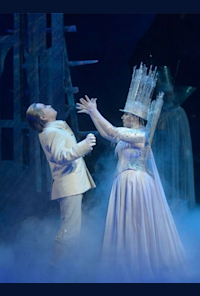The Story of Kai and Gerda (Die Geschichte von Kai und Gerda), Banevich
Teilen
Mariinsky Theatre (2022/23)Informationen von einer Kunstorganisation (verifiziert durch Operabase)
24 Dezember - 29 Januar 2022/23 (3 Aufführungen)
WiederaufnahmeWebseite besuchen|
Russisch
Russisch/Englisch
|
2h 20mins
Die Geschichte von Kai und Gerda by Banevich, Ab (2022/2023), Unter der Regie von Alexei Stepanuyk,, Dirigat Zaurbek Gugkaev, Mariinsky Theatre, Sankt Petersburg, Russland
Aufführungskredite (Besetzung & Produktionsteam )
Produzent
Dirigat
Regie
Besetzung
Kai
SK(2022 Dez. 24)
Gerda
AD(2022 Dez. 24)
The Lamplighter

(2022 Dez. 24)
The Snow Queen
AM(2022 Dez. 24)
The Grandmother

(2022 Dez. 24)
The Old Robber Woman
IN(2022 Dez. 24)
The Little Robber Girl
RR(2022 Dez. 24)
The Reindeer

(2022 Dez. 24; 2023 Jan. 21)
Produktionsteam
Bühnenbild
Lichtgestaltung
Videogestaltung
Choreographie
Korrepetition
Assistant Stage Directors
Kostümbild
Programm, Über & Zusammenfassung
Videos
1Fotos
15Weiterführende Literatur
Erfahren Sie mehr über den Komponisten
Erfahren Sie mehr über Werk



